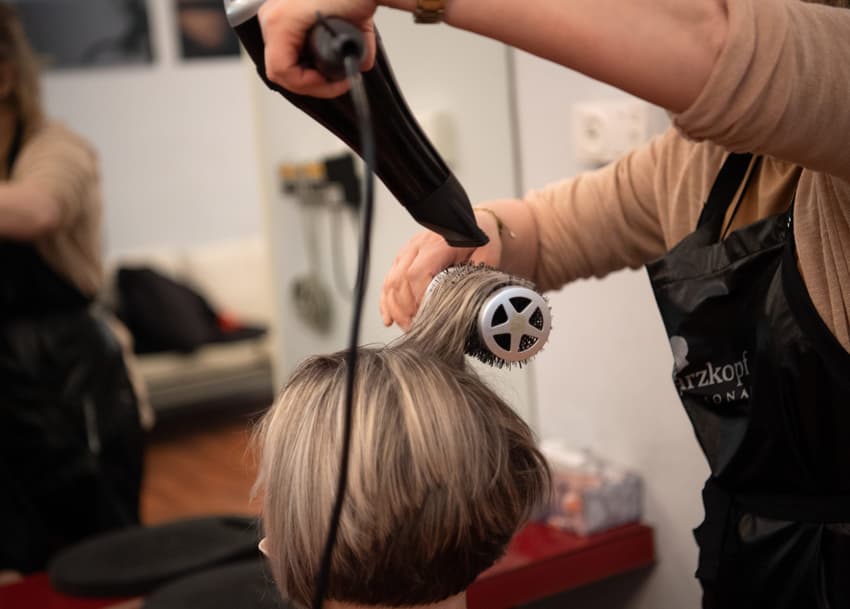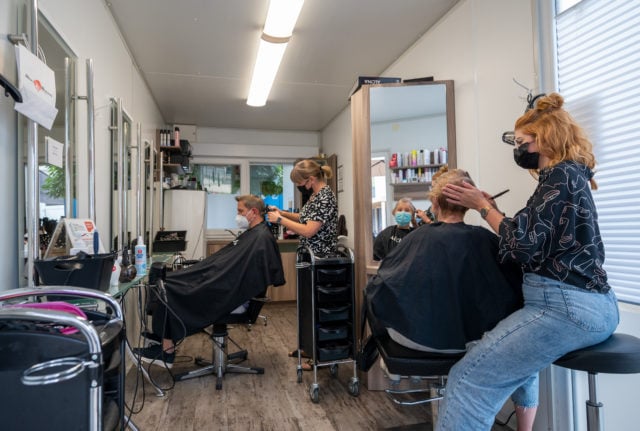What you need to know about getting a haircut in Germany

There’s nothing quite like the feeling of having a new haircut, but it can be a bit daunting going to a hairdressers if you don’t speak the language fluently. Here’s what you need to know about visiting a hair salon in Germany.
How to find a hair salon
Like with most other services, Google Maps is a pretty reliable source for finding hair salons in your local area.
The German word for hairdresser is (der) Friseur, and just typing Friseur into Google Maps while walking down the street will usually bring up several places to choose from.
Another popular app for beauty treatments in Germany is Treatwell which you can use to search for making appointments, choosing services and paying in advance without having to call anybody.
The harder part is picking a good, trustworthy salon. For this, it’s advisable to read Google reviews and also the customer reviews on Treatwell.
Making an appointment
For women’s haircuts, you will need to make an appointment at most salons.
If you find a salon that you like the look of, usually you can just make an appointment on their website or on by phoning them.
Don’t expect your hairdresser to be able to speak English, however, and prepare yourself for the conversation beforehand by looking through our vocabulary list below.
They might ask you to specify exactly what you would like done to your hair (what type of cut or colour; whether you want a blowdry; etc).
What about pricing?
Prices vary, and the price for a cut and colour will depend on the length of your hair – the shorter your hair the less expensive typically. Most hairdressers will list their prices on their websites.
If you're having highlights (Stränchen) done, most hairdressers will also list the price for an individual highlight, or for having a full (ganzer Kopf) or half head (halber Kopf) of highlights.
You can count on spending a minimum of €25-30 for just a cut (Schnitt), and this will be considerably more expensive at fancier salons. A cut and blowdry (with a hair wash) often costs around €60 in Berlin.

People get their hair cut in Kordel, Rhineland-Palatinate. Photo: picture alliance/dpa | Harald Tittel
In almost all salons in Germany, you will be asked beforehand if you want your hair to be washed before cutting. For non-German customers, this might seem like a purely rhetorical question but bear in mind that this is something you will also be charged for.
However, it’s advisable not to try and get around the cost of having your hair washed by turning up with already soaking wet hair. Not only will it probably get you off on the wrong good with your hairdresser, but it will prevent them from getting an idea of what your hair usually looks like.
Tipping
If you're happy with your haircut, then tipping your stylist between 5 and 15 percent is encouraged. A lot of salons have a piggy bank or box at the cash register with the stylists' names on them where you can deposit your tip.
Common phrases you might use:
A wash and cut - Einmal waschen und schneiden.
Only trim the ends - Nur die Spitzen schneiden.
I’d like a new hair colour - Ich möchte eine neue Haarfarbe .
I’d like to have highlights - Ich möchte gerne Strähnchen haben.
I would like to have my roots dyed - Ich möchte meinen Ansatz färben lassen.
I would like to have layers cut in my hair - Ich möchte meine Haare stufig schneiden lassen.
I’d like it to be shorter on the sides and long on top - Ich möchte es seitlich kurz und oben etwas länger.
I’m not sure. What haircut would look good on me? - Ich bin mir nicht sicher. welcher Schnitt würde mir gut passen?
I’d like a perm - Ich möchte eine Dauerwelle.
Can you straighten it? - Können Sie es glätten?
Can you touch up my roots? - Können Sie mir den Ansatz nachfärben?
I’d like blond overtones/highlights - Ich hätte gerne ein paar blonde Highlights.
I need an elegant hairdo for a wedding - Ich brauche eine elegante Frisur für eine Hochzeitsfeier.
I’d like it to be shorter on the sides and longer on top - Ich möchte es seitlich kurz und oben etwas länger.
The key terms
hair treatment - (die) Haarkur / die Haarmaske
hair - (die) Haare
der Frisur (m)/Die Friseurin (f) - hairstylist
wash and cut - waschen und schneiden
schneiden und föhnen – cut and blow dry
short hair - kurze Haare
long hair - lange Haare
straight - glatt
curly - lockig
fringe - (der) Pony
ponytail - (der) Pferdeschwanz
cut in layers - stufig
electric shaver - der Rasierapparat
ends - (die) Spitze
parting - (der) Scheitel
highlights - (die) Stränchen
blowdry - föhnen
Toner (a semi-permanent colouring treatment) - die Abmattierung
Comments (1)
See Also
How to find a hair salon
Like with most other services, Google Maps is a pretty reliable source for finding hair salons in your local area.
The German word for hairdresser is (der) Friseur, and just typing Friseur into Google Maps while walking down the street will usually bring up several places to choose from.
Another popular app for beauty treatments in Germany is Treatwell which you can use to search for making appointments, choosing services and paying in advance without having to call anybody.
The harder part is picking a good, trustworthy salon. For this, it’s advisable to read Google reviews and also the customer reviews on Treatwell.
Making an appointment
For women’s haircuts, you will need to make an appointment at most salons.
If you find a salon that you like the look of, usually you can just make an appointment on their website or on by phoning them.
Don’t expect your hairdresser to be able to speak English, however, and prepare yourself for the conversation beforehand by looking through our vocabulary list below.
They might ask you to specify exactly what you would like done to your hair (what type of cut or colour; whether you want a blowdry; etc).
What about pricing?
Prices vary, and the price for a cut and colour will depend on the length of your hair – the shorter your hair the less expensive typically. Most hairdressers will list their prices on their websites.
If you're having highlights (Stränchen) done, most hairdressers will also list the price for an individual highlight, or for having a full (ganzer Kopf) or half head (halber Kopf) of highlights.
You can count on spending a minimum of €25-30 for just a cut (Schnitt), and this will be considerably more expensive at fancier salons. A cut and blowdry (with a hair wash) often costs around €60 in Berlin.

In almost all salons in Germany, you will be asked beforehand if you want your hair to be washed before cutting. For non-German customers, this might seem like a purely rhetorical question but bear in mind that this is something you will also be charged for.
However, it’s advisable not to try and get around the cost of having your hair washed by turning up with already soaking wet hair. Not only will it probably get you off on the wrong good with your hairdresser, but it will prevent them from getting an idea of what your hair usually looks like.
Tipping
If you're happy with your haircut, then tipping your stylist between 5 and 15 percent is encouraged. A lot of salons have a piggy bank or box at the cash register with the stylists' names on them where you can deposit your tip.
Common phrases you might use:
A wash and cut - Einmal waschen und schneiden.
Only trim the ends - Nur die Spitzen schneiden.
I’d like a new hair colour - Ich möchte eine neue Haarfarbe .
I’d like to have highlights - Ich möchte gerne Strähnchen haben.
I would like to have my roots dyed - Ich möchte meinen Ansatz färben lassen.
I would like to have layers cut in my hair - Ich möchte meine Haare stufig schneiden lassen.
I’d like it to be shorter on the sides and long on top - Ich möchte es seitlich kurz und oben etwas länger.
I’m not sure. What haircut would look good on me? - Ich bin mir nicht sicher. welcher Schnitt würde mir gut passen?
I’d like a perm - Ich möchte eine Dauerwelle.
Can you straighten it? - Können Sie es glätten?
Can you touch up my roots? - Können Sie mir den Ansatz nachfärben?
I’d like blond overtones/highlights - Ich hätte gerne ein paar blonde Highlights.
I need an elegant hairdo for a wedding - Ich brauche eine elegante Frisur für eine Hochzeitsfeier.
I’d like it to be shorter on the sides and longer on top - Ich möchte es seitlich kurz und oben etwas länger.
The key terms
hair treatment - (die) Haarkur / die Haarmaske
hair - (die) Haare
der Frisur (m)/Die Friseurin (f) - hairstylist
wash and cut - waschen und schneiden
schneiden und föhnen – cut and blow dry
short hair - kurze Haare
long hair - lange Haare
straight - glatt
curly - lockig
fringe - (der) Pony
ponytail - (der) Pferdeschwanz
cut in layers - stufig
electric shaver - der Rasierapparat
ends - (die) Spitze
parting - (der) Scheitel
highlights - (die) Stränchen
blowdry - föhnen
Toner (a semi-permanent colouring treatment) - die Abmattierung
Join the conversation in our comments section below. Share your own views and experience and if you have a question or suggestion for our journalists then email us at [email protected].
Please keep comments civil, constructive and on topic – and make sure to read our terms of use before getting involved.
Please log in here to leave a comment.